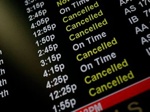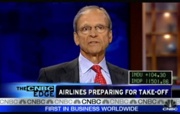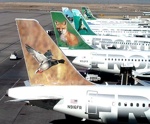
Last week in the United Airlines’ earnings call, CEO Glenn Tilton more or less dismissed a question from reporter Dan Reed from USAToday concerning increasing pilot staffing issues and cancelled flights at the airline.
The question was relevant, as we talked about in PlaneBusiness Banter two weeks ago. Why? Because based on conversations we were having with folks close to the situation, and comments from subscribers, it was pretty obvious that a situation was developing at United that resembled, in many aspects, the showdown between pilots and management at Northwest Airlines last summer.
There didn’t seem to be any question that pilots at the airline were engaging in a little “work to rule” as the end of the month rolled around. Just as we saw with Northwest last year, if you have pilots who refuse to pick up extra flying, along with higher than normal sick time calls, and you’ve got flying schedules maxed out because of summer schedules — all the ingredients are there for an opportunity to force the airline into flight cancellations.
This week, apparently United Airlines does consider the issue relevant, as today the airline filed a lawsuit seeking a preliminary injunction against the pilot union, ALPA, and a group of individual United pilots, for allegedly abusing sick time.
The injunction request accuses the ALPA of encouraging a sick-out, which is not allowed under the Railway Labor Act. It also said that pilots were refusing to pick up extra flying, and that others were being intimidated into not taking on additional flying.
“ALPA’s communications are essentially a guide describing how to use sick leave inappropriately,” United’s injunction request said.
United said in its request that the first officers on its Boeing 737s and Airbus A320s had called in sick the most frequently. First officers on Boeing 737s had called in sick more than twice as much over the past seven weeks versus the prior three years, and sick calls by Airbus 320 first officers had risen 61%, the airline said.
United said it canceled 329 flights between July 19 and July 27, costing it about $8 million in lost revenue and $3.9 million in operating profit.
Talks between the union and the airline apparently broke off last week, according to United COO John Tague, who issued a message to employees this afternoon in which he said,
“Despite these significant steps, unlawful job actions escalated, intimidation of pilots continued and the impact on our customers and other employees grew to truly unacceptable levels,” he said.
Specifically, according to the Associated Press (we have not seen a copy of the actual request to the Federal Judge as of yet, we’re off to find one) the airline accused pilot Anthony Freeman of starting a Web site to organize the sick-out by junior pilots. It said the group was called “the 2172” because they were among the 2,172 pilots furloughed by United in 2001.
The other three pilots named by United — Steven M. Tamkin, Robert J. Domaleski, Jr., and Xavier F. Fernandez — are members of the Industrial Relations Committee of the Master Executive Council at United’s ALPA unit.
All of this comes three days after we received a missive in our in-box from the United ALPA MEC. The missive was entitled, “The beatings will continue until morale improves.”
According to the “Unity Update #6”,
“The Beatings Will Continue Until Morale Improves
How’s your summer going? Just in time for the long, hot, busy summer season, United Airlines is implementing and refining some new methods to erode your job and quality of life even further. This company’s contempt for its employees is further proof that United is flying itself into the ground and doesn’t care who it takes down with it — not you, not me, not its customers. In the meantime, the executives continue to enrich themselves from the company’s coffers.
Here are some examples of management’s patented morale-boosting initiatives that make United Airlines such a desired place to work.
● For starters, we’ve all heard of United’s plans to use our pilots and their families as expendable commodities in an attempt to correct its inability to contain costs or adequately plan for the future. Some of the soon-to-be-furloughed pilots, who relied on United’s good faith to come back, are being let go a second time. Who will ever again have faith in United Airlines? But first, United will work your heinies off for the summer with maximum hours and minimum days off (flex months), and then fire you. How’s your summer going?
● To assist United in its unwillingness to maintain any workable and flexible trip trading system, management will refocus and lower the trigger points for Absence Monitoring System (AMS) events, questioning a pilot’s compliance with FARs regarding “fit to fly.” And if they don’t believe you, you will be required to visit a doctor and pay for it out of your own pocket since our company will not reimburse you. Oh, and we understand from reliable sources that the company plans on taking away pass travel while you’re on sick list and, this time around, your family too. How’s your summer going?
● In a blatant attempt to erode, if not eliminate, Captain’s Authority, First Officers are soon to replace Captain’s as FODMs. As you are aware, FODMs have the ability to order Captains to fly. Even though many First Officers have the experience and capability, United will be breeding an environment where there will be First Officers ordering Captains to fly, questioning Captains’ decisions and placing Captains in defensive positions. How’s your summer going?
● With the expected shift in flying, many domiciles will temporarily pick up other domiciles’ flying. This will result in many W-patterns, flying 6 day trips with 4 oceanic crossings. When the flying becomes aligned with the domiciles, your reward for having worked your keisters off will be more surpluses. Reread the first bullet point. How’s your summer going?
To summarize, United’s managers will force pilots to work extra days with longer hours, they will bully pilots to prove their non-fitness to fly at their own expense, they will attempt to take away pass travel for you and your family, they will attempt to diminish Captain’s authority, they will take away United mainline flying and give it away to Express, and then they will either furlough you or surplus you at the end of the season. No one will be unaffected by the continually bad decisions United makes every day. Fatigue, stress, illness, exhaustion, anger, fear, depression, resentment, uncertainty, frustration and disrespect are all being crammed down our throats by a company that gives not a damn about goodwill, morale, its employees or its customers.
So, how’s your summer going?
Leverage does not just show up, unannounced, on one’s doorstep. Unified pilots create leverage.
UNITY OF PURPOSE BRINGS POWER
THERE IS POWER IN UNITY”
How’s my summer going? I’ll have my cheeseburger in Paradise now, thank you very much.




![1[2]](https://www.planebuzz.com/1%5B2%5D-tm.jpg)



